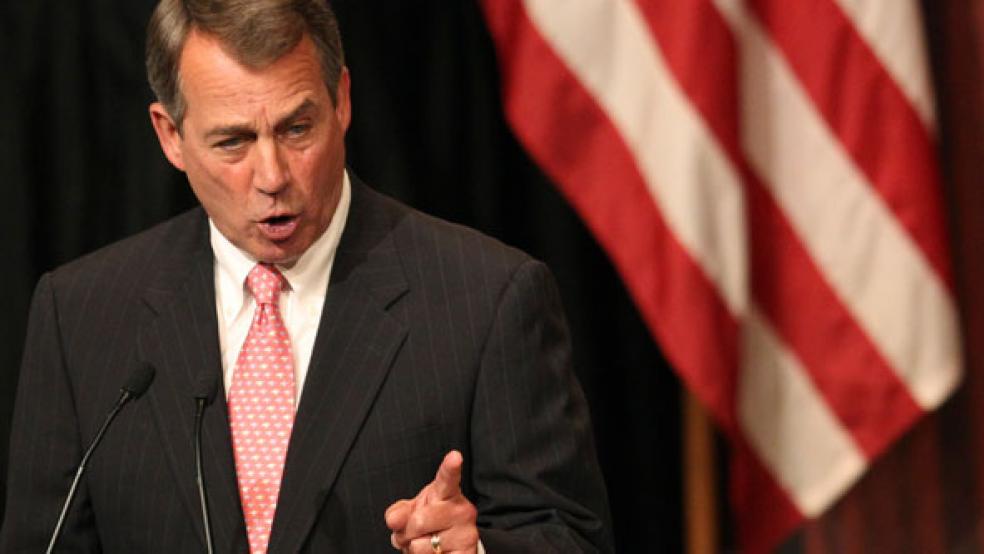Republican House Speaker John Boehner is playing a dangerous game in his thus far rocky negotiations with President Obama over a budget and tax deal to avoid the fiscal cliff. He’s isolating the most hard line conservative members within his caucus adamantly opposed to the tax increases contained in his counteroffer to President Obama by kicking them off key committees.

Alison Acosta Fraser and J.D. Foster of the Heritage Foundation posted an irate blog saying that the House GOP counter offer at first blush “appears little more than categorical, pre-emptive capitulation” on taxes. They added that despite a few encouraging provisions of the offer, spelled out by Boehner and other GOP leaders in a three-page letter to the president on Monday, the Republican counteroffer, to the extent it can be interpreted from the hazy details now available, is a dud. It is utterly unacceptable. It is bad policy, bad economics, and, if we may say so, highly questionable as a negotiating tactic.”
In an attempt to give their approach added credibility, Boehner and other House GOP leaders crafted a new plan using a number close to what was suggested last year by Erskine Bowles, the Democratic co-chairman of the president’s deficit reduction commission.
The White House with a wave of the hand dismissed the speaker’s counter offer on Monday – one with deep spending cuts but $800 billion of new tax revenues. But so too did outspoken conservative Sen. Jim DeMint, R-S.C., Heritage Action and RedState bloggers and others who sharply condemned the offer as a job-killing tax increase that completely plays into the administration’s hand.
“Speaker Boehner’s $800 billion tax hike will destroy American jobs and allow politicians in Washington to spend even more, while not reducing our $16 trillion debt by a single penny,” DeMint, a Tea Party favorite, said in a statement. “If neither party’s leadership is going to put forward a serious plan to balance the budget and pay down the debt, we should end this charade.”
Daniel Horowitz, writing for the conservative Red State, said, “First, when you begin negotiations agreeing to 60 percent of the demands of the other side and fail to offer a bold contrast on the other 40 percent, you are headed for an outcome that is 80-90 percent favorable to your opponent. Second, when you need to outsource your budget plan and entire view of government to Democrat Erskine Bowles, you are relegating yourself and your party to irrelevancy.”
Perhaps with the memory etched in his brain of the debacle of the 2011 debt ceiling negotiations that led to Standard & Poor’s downgrading of the U.S. credit rating , Boehner appears to be trying to mitigate the influence of the most conservative activists while unifying the rest of his party behind a bargaining strategy that ultimately will pass muster with voters. In their letter to Obama, Boehner and other House leaders acknowledged that they were “mindful of the status quo election” on Nov. 6 that gave Obama a second term and expanded the Democrats’ membership in both the House and Senate.
Significantly, Boehner has brought along all of his top lieutentants who enjoy close ties to the most conservative factions in the House, including Majority Leader Eric Cantor, Majority Whip Kevin McCarthy, and House Budget Committee Chairman Paul Ryan, the unsuccessful GOP vice presidential nominee.
Boehner, Cantor, R-Va., and McCarthy, R-Calif., have worked hard to keep conservative groups on the outside in line as they try to strike a massive deal to keep taxes low on all Americans and avoid spending cuts to the Pentagon and other domestic programs, according to a report by Politico.
During a closed meeting on Monday, House Republicans booted Reps. Justin Amash of Michigan, David Schweikert of Arizona and Tim Huelskamp of Kansas -- all freshmen -- and Rep. Walter Jones of North Carolina from plum committee assignments, according to Politico. Retribution for members who voted against Boehner’s team was long discussed in leadership circles.
Huelskamp, who lost his seat on the Budget Committee, was particularly stung. The budget is his main issue, and he sent a blistering statement Monday evening, saying, “the GOP leadership might think they have silenced conservatives, but removing me and others from key committees only confirms our conservative convictions.”
While Boehner appears to be moving more confidently than he did shortly after Tea Party conservatives helped to catapult him and his party back into power in the House, he has to be careful not to stray too far from his conservative base in his high stakes talks with Obama. During the debt ceiling crisis of 2011, Boehner was forced to abruptly call off his secret negotiations with Obama when House conservatives erupted over reports that the speaker was agreeing to tax increases.





